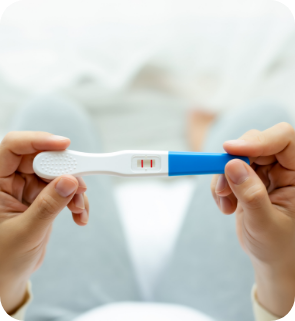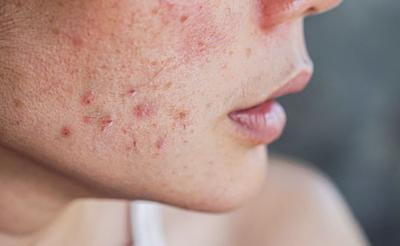
I've Been Diagnosed With PCOS: Now What?
For such a complex condition that is PCOS, it’s hard to believe that women are left to their own devices after the initial diagnosis.
For example, about every 12 minutes each day our inbox will receive a message from a woman who is suffering from PCOS. Each of these women, though, will have entirely different cases - they’ll suffer from different symptoms, and they’ll have completely different goals.
This highlights an important truth about PCOS:
Every woman with PCOS will experience PCOS differently.
Despite this, doctors still prescribe the same treatment. Usually in the form of birth control or metformin (or both!). But before we criticise, there are good reasons for this.
Firstly, hormonal birth control (HBC) is prescribed for three main reasons:
1. There’s no fix: they can’t just give you a medicine that will instantly heal your PCOS; instead, they try to help you manage it. And that’s what HBC tries to do - help manage your symptoms.
2. Induces regular periods: if a woman were to regularly go without a period for longer than 3-4 months at a time it can cause a buildup of uterine tissue, which is called endometrial hyperplasia. This vastly increases the chances of endometrial or uterine cancer. Obviously, doctors want to ensure there’s no risk.
3. Lowers androgen levels: HBC increases levels of sex hormone-binding globulin (SHGB), which decreases testosterone (androgen) levels, thus improving high-androgen symptoms like hair growth, hair loss and acne.
This line of treatment makes sense, but it’s best to not deny the truth about HBC: Once women come off it, they tend to experience the same symptoms as they did before they started.
This is because HBC does not balance hormones; rather, it creates a synthetic, chemical-induced cycle (“fake” cycle) and switches off their hormones. This explains why women who are taking HBC can temporarily reduce their PCOS symptoms.
Metformin, too, is prescribed by doctors for three main reasons:
1. It improves insulin sensitivity: 70% of women with PCOS will have insulin resistance. By improving your sensitivity to insulin, you can improve this condition and the symptoms it causes - weight gain, poor energy & cravings.
2. Decreases androgen excess: This is a hallmark of PCOS, and is responsible for those unwanted symptoms like acne, hair growth, fertility issues and male pattern hair loss.
3. Improves fertility chances: Due to its impact on insulin resistance and androgen excess, studies have shown that metformin increases ovulation and pregnancy rates in women with PCOS.
At first glance, metformin seems to be a wonder drug for PCOS. But with more and more anecdotal and clinical evidence, the results have been underwhelming.
This is partly due to the individual nature of PCOS; a caveat for any “blanket” treatment for PCOS such as HBC and metformin.
For example, Nicole’s PCOS is driven by her insulin resistance, so metformin may be effective for her as it improves insulin sensitivity.
But Rachel’s PCOS is driven by inflammation, so taking metformin has little benefit. Confused and frustrated, she wonders why the heck her symptoms have worsened.
This, again, highlights the important truth about PCOS:
Every woman with PCOS will experience PCOS differently.
After the diagnosis, it usually stops here: a woman is prescribed metformin or HBC, and sent on her way with no real understanding of her PCOS. Plus, she has a tidal wave of confusion about what to do next if symptoms were to persist or even worsen.
But by understanding her own PCOS and how it may be affecting her, she can break free of this confusion and begin to properly manage her symptoms.
I’ve made a diagram to help with the understanding of one’s own PCOS - it’s an introduction to the 4 levels in which a woman experiences the condition:
Before I explain this diagram, let’s remember that PCOS is experienced differently by each individual. This means the factors that make up each level will differ for each woman who has PCOS.
Let’s start at the fourth level, as it is often overlooked by professionals. Living with PCOS can make life very difficult - each day it can impact your relationships, mood, mindset, body confidence, or self-esteem.
Sometimes all of the above.
Exacerbating the impact is the lack of support, empathy, knowledge and care that each woman with PCOS receives. This is not something that should be overlooked; rather, it should be prioritised.
Driving the real life impacts is the third level, or the day-to-day symptoms. These could be hair loss or hair growth, weight gain, fatigue, sleep issues, menstrual and fertility issues among others.
It’s important to understand that it is a woman’s hormonal imbalances that are causing these symptoms; in other words, a woman’s hormonal imbalances dictate the symptoms she will likely suffer from.
And it’s hormonal imbalances that make up the second level, which can range from high insulin or androgens to issues around menstrual hormones such as LH/FSH ratio, estrogen and progesterone.
Just as hormonal imbalances determine the symptoms a woman will experience, the underlying condition or driver of PCOS is creating the hormonal imbalances she is suffering from.
This is the first level - the underlying driver. What does this term mean exactly?
If a woman has a susceptibility to androgen excess (a key characteristic within a PCOS diagnosis), then she can be pushed into full-blown PCOS by exposure to various drivers. These drivers or conditions include insulin resistance (IR), inflammation, adrenal, and post-pill.
For 70% of women with PCOS, the driver will be insulin resistance. Because this makes up the majority, experts suggest that ALL women with PCOS be treated for insulin resistance; this explains why metformin is so often prescribed.
But how do these underlying conditions actually drive PCOS?
Let’s go through an example with insulin resistance. IR leads to high insulin in the blood (hormonal imbalance), which can impair ovulation and cause the ovaries to make testosterone instead of estrogen.
Too much insulin also stimulates your pituitary to make more luteinising hormone (LH), which stimulates even more androgens. Lastly, too much insulin lowers the sex hormone binding protein (SHGB), which results in even higher androgen levels.
Like IR, the other underlying conditions will drive androgen excess through the hormonal imbalances that they create, thus causing a woman to be pushed into full-blown PCOS.
Unless these underlying drivers are properly treated, the hormonal imbalances, thus symptoms and real life impacts will persist and continue to cause the daily struggle that a lot of women with PCOS experience. But before an underlying driver is treated, it must be identified.
And this is the next best step for a woman who has just been diagnosed with PCOS, or for a woman who has been previously diagnosed but is genuinely confused about how to manage her symptoms.
There are two ways of identifying a woman’s underlying PCOS driver:
1. Blood Tests
Testing & Results For Insulin Resistant PCOS:
• Free and total testosterone (typically elevated free OR total testosterone)
• Fasting blood glucose (elevated fasting glucose)
• Hgb A1c (which stands for hemoglobin A1c) (elevated Hgb A1c, typically higher than 5.7%)
• Fasting insulin (elevated fasting insulin)
Testing & Results For Inflammatory PCOS
• CRP (C-reactive protein) (elevated)
• ESR (erythrocyte sedimentation rate)
• Possible elevated DHEA
• Vitamin D deficiency
Testing & Results For Adrenal PCOS
• Free and total testosterone (normal range for both)
• Serum DHEA (elevated serum DHEA levels)
• 8 am serum cortisol (High or normal serum cortisol)
• Insulin resistance (normal insulin and blood sugar)
2. Symptom Analysis
Presentation Of Insulin Resistant PCOS
• Most likely overweight
• Suffer from acne, hair growth and/or hair loss, irregular periods
• Mood and sleep issues
Presentation Of Inflammatory PCOS
• Fatigue and unexplained tiredness
• Digestive issues and food sensitivities
• Recurring infections, skin issues, headaches, and joint pains
Presentation Of Adrenal PCOS
• Most likely overweight but can be of normal weight, too
• Suffer from acne, hair growth and/or hair loss, irregular periods
• Issues arising from stress such as fatigue, mood issues, and sleep issues
Presentation Of Post-Pill PCOS
• Did not suffer any PCOS like symptoms before starting birth control
• Suffering from PCOS like symptoms since coming off birth control
If you have recently been diagnosed with PCOS or if you are struggling to manage your symptoms, then identifying your underlying driver (or type of PCOS) is the next best step I will recommend.
And you can find out what it is for you right now, if you like.
I’ve combined both methods - blood tests and symptom analysis - within a Quiz that only takes a few minutes to complete. It could save you months of trying to identify your underlying PCOS driver.
If you want, take the QUIZ below to help identify your PCOS type.
It's just here to help you gain a little more confidence in your PCOS journey. :)
















